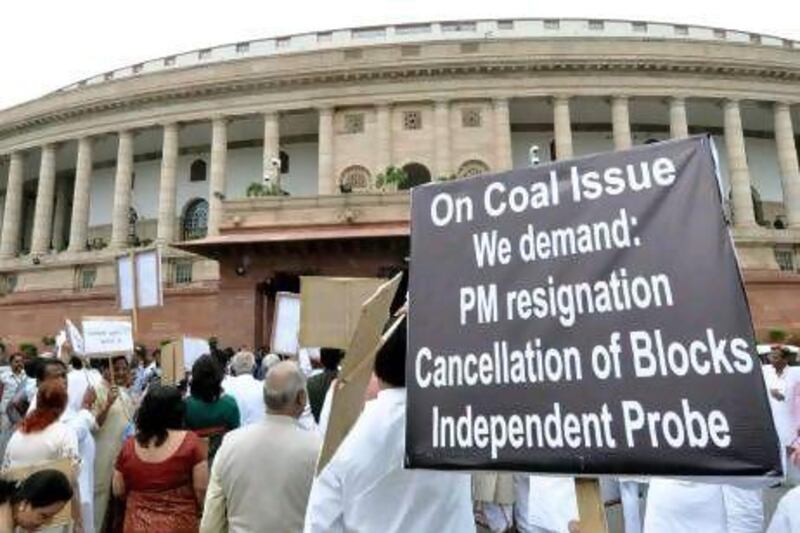NEW DELHI // The washout of the Indian parliament's month-long monsoon session, which ended on Friday, has revived concerns that the unruly conduct of legislators is diluting the efficacy of India's democracy.
During the session, the opposition Bharatiya Janata Party (BJP) raised slogans, staged walkouts and disrupted activity, trying to pressure the prime minister Manmohan Singh to resign over an alleged coal-mining scam.
According to PRS Legislative Research, an independent New Delhi-based research institute, nearly 80 per cent of the working hours of the Lok Sabha, parliament's lower house, were lost during the session.
In the Rajya Sabha, the upper house, that statistic stood at 73 per cent.
Hamid Ansari, India's vice president and chairman of the Rajya Sabha, said at the close of parliament on Friday: "This session is likely to be remembered for work not done."
Such disruptions of parliament have started to become the norm more than the exception. Devika Malik, a PRS spokesperson, told the Associated Press that 2012 has been only marginally better" than 2010, when the BJP had stalled parliamentary proceedings over a telecommunications scandal.
Both of the country's main parties - the Congress and the BJP - have been responsible for the unruly behaviour.
On Friday, addressing a press conference, Kapil Sibal, a senior Congress minister, reminded journalists that in 2001 the BJP had opposed similar disruptions by the Congress. "We are saying the same today," Mr Sibal said.
Manuals of parliamentary decorum and etiquette have, over the years, spelt out norms of behaviour. In 2001, a 60-point code of conduct to govern parliamentary behaviour was approved.
In a 2003 handbook, Yogendra Narain, the general secretary of the Rajya Sabha, wrote that a member of parliament must "rise in his place to attract the attention of the Chair" and "resume his seat" if the Chairman calls him to order.
Another regulation - violated often during the recent session - reads: "A member should not interrupt any other member who is speaking, by disorderly expression or noise in any other disorderly manner."
A week ago, Shashi Tharoor, the writer and Congress parliamentarian, told the Press Trust of India: "When you see this kind of disruption going on, I do not understand why it is not possible to suspend those who are disrupting the functioning of the house so that the rest of the house can get on with the nation's business."
Indeed, the speaker of the Lok Sabha and the deputy chairman of the Rajya Sabha have been allocated the responsibility of maintaining decorum in their house, and have been given powers to suspend members for unruly behaviour.
But these powers are rarely exercised, partly because the speaker and the deputy chairman do not wish to appear partisan, a senior Congress party member told The National.
In India, the Congress member said: "Protesting has become an accepted part of the parameters of conduct. The Congress does it, the BJP also does it."
But legislators were not censured enough, he said. "There was an incident in the Rajya Sabha this session, where two members were engaged in a fist-fight," he said. "I think that was a fit case for suspension."
Sushma Swaraj, the leader of the BJP in the Lok Sabha, has contended that even stalling parliament can help the opposition send a message.
"Even if there has been a loss of parliament's debating time, on account of the very nature of our protest, we are confident that this protest … will cleanse the process for a fair system of allocation of natural resource," Ms Swaraj said on Friday evening.
ssubramanian@thenational.ae





